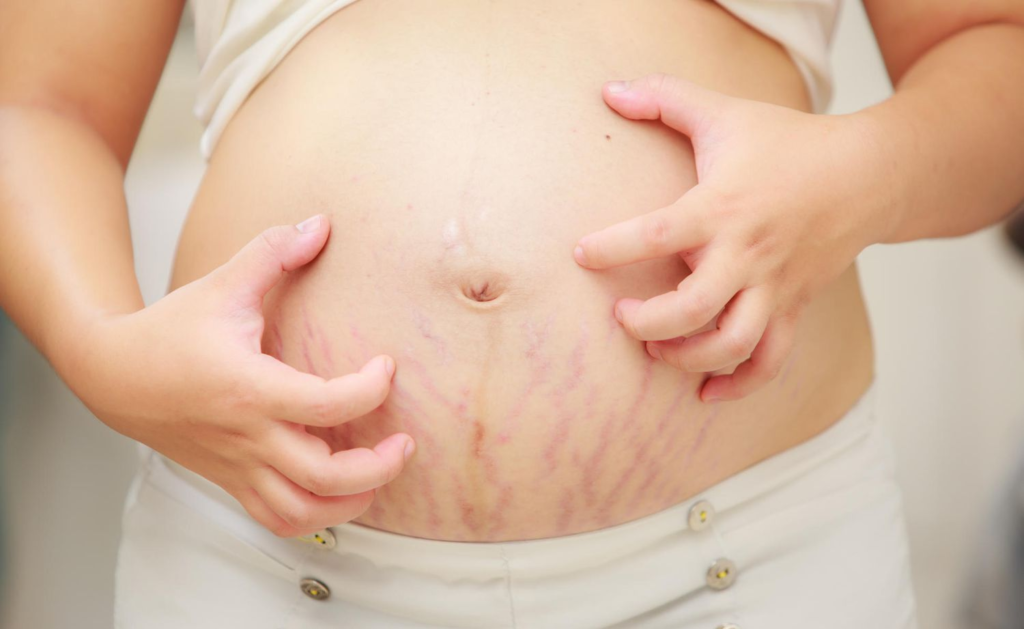Share This Article
Itchy skin is something everyone experiences at some point, but it becomes particularly common during pregnancy. Your body undergoes remarkable changes to support your growing baby, and the accompanying hormonal shifts, skin stretching, and other factors can trigger discomfort. While most itching during pregnancy is harmless, some cases may indicate underlying health concerns that require medical attention.
Let’s explore why itching happens during pregnancy, common conditions like PUPPP (Pruritic Urticarial Papules and Plaques of Pregnancy), and tips for managing and preventing itchy skin.
What Causes Itchy Skin During Pregnancy?

Several factors can contribute to itchy skin during pregnancy, including:
- Skin Stretching
- As your belly grows, the skin stretches significantly, especially during first pregnancies or multiple pregnancies, leading to itching.
- Dry Skin
- Hormonal fluctuations can cause your skin to become dry and flaky, contributing to itchiness.
- Irritants
- Fragranced products, perfumes, or certain fabrics can irritate sensitive pregnancy skin.
- Hormonal Changes
- Pregnancy hormones affect your skin’s sensitivity, circulation, and overall texture, potentially leading to itching.
- Cholestasis of Pregnancy
- This liver condition causes bile acids to accumulate in the bloodstream, leading to severe itching, especially on the palms and soles.
Pruritic Urticarial Papules and Plaques of Pregnancy (PUPPP

PUPPP is a common pregnancy-related skin condition characterized by:
- Appearance: An itchy rash that develops near stretch marks in late pregnancy, with pimple-like spots and small blisters.
- Symptoms: Intense itching, often worse at night, accompanied by red patches.
Diagnosis and Treatment:
- Your doctor may diagnose PUPPP through a skin exam and, in rare cases, a biopsy.
- While PUPPP typically resolves after delivery, treatments include:
- Moisturizers to soothe skin.
- Steroid creams or antihistamines prescribed by your doctor.
- Cool oatmeal baths for temporary relief.
Prurigo of Pregnancy

Prurigo is another condition marked by crusty, itchy bumps on the arms, legs, or abdomen.
- Symptoms: Pimples or crusted bumps accompanied by persistent itching.
- Treatment: Topical steroids and oral antihistamines are the most common remedies.
Although prurigo may fade post-delivery, it can linger for weeks or months. Women with prurigo in one pregnancy are more likely to experience it again.
READ MORE: Understanding the Impact of Smoking and Alcohol on Menstrual Regularity
Common Areas for Itching

- Abdomen and Breasts: Rapid skin changes in these areas often cause itching.
- Stretch Marks: PUPPP-related itching frequently occurs near stretch marks.
- Arms and Legs: Itching here is more likely related to prurigo or clothing irritation.
- Vaginal Itching: This might indicate an infection requiring treatment.
Preventing and Managing Itchy Skin
If itchy skin is disrupting your pregnancy experience, these tips can help:
- Apply a Thick Cream
- Choose creams with safe, pregnancy-friendly ingredients to keep your skin hydrated.
- Use Moisturizers with Petrolatum
- Petrolatum forms a protective barrier, locking in moisture and soothing skin.
- Cold Compresses
- Ice packs or cold cloths can relieve discomfort in localized areas.
- Switch to Unscented Products
- Perfumed detergents and lotions may irritate sensitive skin. Opt for gentle, fragrance-free alternatives.
- Consider a Cornflour Bath
- Adding cornflour to your bath might help alleviate itching. Always consult your doctor first.
- Take Short, Cool Showers
- Avoid hot showers that can strip your skin of natural oils and worsen dryness.
- Stay Hydrated
- Drinking plenty of water helps maintain your skin’s elasticity and hydration.
Common Pregnancy Skin Conditions
In addition to itching, pregnancy can bring about other skin changes:
- Hyperpigmentation and Melasma: Dark patches, often on the face, caused by increased melanin production.
- Stretch Marks: Reddish or purplish marks that gradually fade post-pregnancy.
- Skin Tags: Small, benign growths that can appear in areas of friction.
- Acne and Psoriasis: Hormonal shifts can worsen pre-existing skin conditions.
- Varicose Veins: Swollen veins in the legs caused by increased blood flow and pressure.
Lifestyle Tips for Itchy Skin Relief
Adopting these habits can minimize itching:
- Wear loose, breathable fabrics like cotton to reduce irritation.
- Avoid hot environments and strenuous activity during peak heat hours.
- Use oatmeal baths once or twice a week to calm inflamed skin.
- Opt for soap-free cleansers and natural products to cleanse your skin gently.
- Run a humidifier in your room to maintain moisture in the air.
Sleep Disruption Due to Itching
Severe itching can interfere with sleep, leading to:
- Fragmented Sleep: Frequent waking to scratch.
- Fatigue: Reduced rest can exacerbate daytime exhaustion.
- Anxiety: Persistent itching may heighten stress, affecting overall well-being.
When to Call Your Doctor
Some itching during pregnancy is normal, but there are instances where medical attention is necessary. Contact your doctor if:
- Itching is severe or affects your ability to sleep.
- You notice yellowing of your skin (jaundice).
- You experience itching primarily on your palms or soles.
- Itching is accompanied by nausea or dark urine, which could indicate cholestasis.
READ MORE: The Role of Self-Compassion in the Journey to Conception
Safe Skin Care Ingredients for Pregnancy
- Acne and Hyperpigmentation: Glycolic acid and azelaic acid are generally safe.
- Wrinkles and Dryness: Vitamin C and hyaluronic acid can help.
- Stretch Marks: Coconut oil and cocoa butter are natural options for hydration.
- Sun Protection: Use mineral-based sunscreens with zinc oxide or titanium dioxide.
Conclusion
Itchy skin during pregnancy is a common but manageable issue. By understanding its causes and taking preventive measures, you can ease discomfort and protect your skin. However, always consult your doctor for persistent or severe itching, as it could signal an underlying condition that requires medical intervention.
Pregnancy is a beautiful journey, and addressing skin concerns can help you focus on the joy of nurturing your baby.
